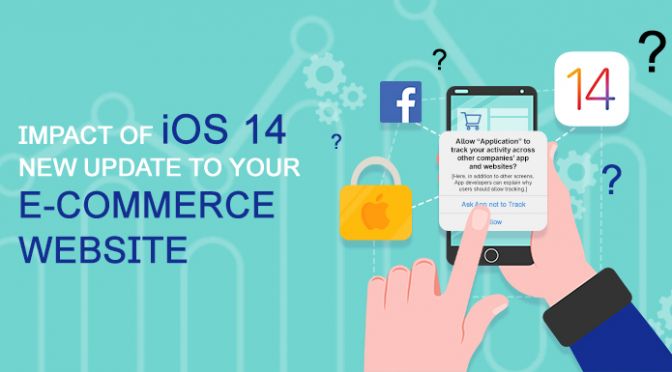Apple has released an update to the latest version of its mobile operating system, iOS 14.
Apple’s new privacy feature will require developers to display their privacy policies, the exact data they’re collecting, and their intentions for said data’s use. Apps are now required to show Apple’s App Tracking Transparency (ATT) prompt, where they ask permission from users to see their IDFA to be able to track iOS them for ad targeting.
The Identifier for Advertisers (IDFA) is a unique identifier for a mobile device. This unique identifier is used to target users for advertising purposes; it allows brands to personalize the ad content for a user, and then measure the effectiveness of their advertising at a user level across mobile devices.
Apple’s new update has made many marketers, business owners, and maybe even you, webshop owners, concerned about how this will affect their businesses. So, let’s break down all the impact of Apple’s new privacy feature on your E-commerce website.
Will the Update Impact E-commerce Website / Webshop?
No. For now, the new privacy feature is only required for apps from the App Store and should not impact website tracking.
However, according to craft52, once the changes from the update go into effect, all major digital advertising platforms could lose visibility on the daily activities of up to 90% of iPhone users (and iPad and Apple TV) almost overnight. This will result in a massive loss in a dataset that powers the powerful algorithms behind big tech’s hyper-effective ad platforms. Though your business isn’t exactly losing data, your business is losing access to a huge trove of data you’ve been mining for customers by using these ad platforms.
This means websites that have been relying heavily on Facebook ads and other ad platforms will be affected by the new update since applications will no longer be able to pass along certain information for detailed ad targeting and conversion results if they do not have permission from users.
Do I need to create a consent pop-out in my webshop/website?
No. As for now, the new Apple feature will only require iOS apps to proactively ask users for permission to track them across other apps and websites. Websites are not affected by this and don’t need permission from the users as well.
Impact in Google Analytics
Most E-commerce website uses Google Analytics to access detailed information regarding their online store’s traffic, sales, revenue, etc.
If you’re one of those webshop owners that use Google Analytics, you don’t have to worry about the effect of the new iOS 14 updates on your analytics. Although Safari 14 also got a new privacy update which is a new privacy report that will contain details about third-party cookies/trackers blocked on the web page a user is currently visiting, this won’t block Google Analytics since it only uses 1st party cookie and not 3rd party cookies to capture data about its web visitors.
First-party cookies are stored by the domain (website) you are visiting directly. They allow website owners to collect analytics data, remember language settings, and perform other useful functions that help provide a good user experience.
Second-party cookies are cookies that are transferred from one company (the one that created first-party cookies) to another company via some sort of data partnership
Third-party cookies are created by domains other than the one you are visiting directly, hence the name third-party. They are used for cross-site tracking, retargeting and ad-serving.
Most of the trackers that were affected by the new version of Safari were those that carry cross-site cookies aka 3rd party cookies.
Impact on Analytics Platforms
After the launch of the iOS 14 update, users who will not give permission to applications to track their data will not be available for retargeting purposes. For businesses, this means you will not be able to build a retargeting audience for users on iOS devices unless the user has given their permission for IDFA tracking. In addition, the IDFA update could cause some user-level reports to become less accurate for iOS apps.
This will only affect businesses that have their own application, so webshop owners can relax and not worry about this since like what we have said, Apple’s new privacy feature is targeted at mobile applications and should not impact website tracking.
Impact on Google Ads
For advertisers using Google Ads, Google has recommended upgrading to the latest version of Google Analytics for Firebase to enable SKAdNetwork support since Google will no longer use the IDFA.
SKAdNetwork, where SK stands for StoreKit, refers to Apple’s SDK which controls how apps are created, run, and manages interactions with advertising. Once iOS 14 is installed, apps installed as a result of in-app advertising will be mediated by Apple’s SKAdNetwork.
This, also, will only apply to applications and not to other businesses.
Impact on Facebook
Facebook mentions a few changes that they’re going to be making in compliance with Apple’s new privacy policy. The first of those changes is Apple’s ATT prompt, which Apple is now forcing Facebook to show. Once a user downloaded the Facebook app, the ATT prompt will show up and ask permission from users to track their data.
These changes will impact how Facebook receives and processes conversion events from tools like the Facebook pixel. Once this is applied in Facebook, businesses that optimize, target, and/or report on mobile web events from any of their business tools will be impacted given Apple’s required limits on data sharing.
In order to minimize disruption, Facebook introduced Aggregated Event Measurement to support measurement of web events from iOS 14 users once Apple requires the ATT prompt.
According to Facebook, “It is designed to help measure campaign performance in a way that is in line with consumers’ decisions about their data.”
Aggregated Event Measurement is a workaround for Facebook Advertisers to reach and report on those users who won’t give their permission to track their IDFA.
This will require Facebook Advertisers to verify their domain for Facebook Advertising and set up 8 event optimizations for conversion campaigns.
Below are the actions you can take now to prepare for Aggregated Event Measurement:
- Plan for 8 conversion events per domain:
Advertisers will be limited to tracking eight-pixel events per domain. This includes both pixel event conversions as well as custom conversions based on specific URLs. Other events can still be used for the creation of website custom audiences, but not for conversion tracking.
If you use more than 8 conversion events per domain for optimization or reporting, prepare an action plan for how to operate with 8 conversion events per domain based on your business priorities. You will not need to make changes to the pixel or Conversions API implementation as event configuration will be done in Events Manager.
We suggest that you refer to a Facebook advertiser expert to help you configure and plan your conversion events.
- Verify your domains:
Verify your domain using the steps outlined in the Facebook Help Center. This is critical for businesses with pixels used by multiple Business Managers or personal ad accounts. Domain verification will ensure no immediate or future disruption in the ability to configure conversion events.
Reach out to us if you want us to put an additional file or meta tag to verify your domain on Facebook.
The iOS 14 update has many marketers and business owners concerned about their future ability to target users, generate leads, and measure conversions from Facebook ads. However, the true impact of this update is currently unknown since the new update, iOS 14.5, has just been released. Only time will tell what overall impact iOS 14 will make.
Disclaimer
We at Shoptech Media are not marketing experts and just want to help our customers keep up with the new technology. All the contents above are based on our research from different sources.
References:
- https://www.theverge.com/2021/1/28/22253366/apple-app-tracking-transparency-opt-in-requirement-beta-launch
- https://developer.apple.com/app-store/user-privacy-and-data-use/
- https://www.facebook.com/business/help/331612538028890?id=428636648170202
- https://woocommerce.com/posts/how-apple-ios-14-impacts-ecommerce-advertising/
- https://craft52.co/blog/2020/12/17/apple-ios14-affect-ecommerce-business
- https://mediatool.com/2021/02/11/how-the-next-ios-14-update-will-impact-your-ads-and-what-you-can-do-about-it/
- https://infotrust.com/articles/apple-ios-14-update/#elementor-toc__heading-anchor-8
- https://developers.facebook.com/blog/post/2020/12/16/preparing-partners-ios-14-mobile-web-advertising/
- https://www.xen.com.au/blog/facebook-advertising-aggregated-event-measurement
- https://blog.google/products/ads-commerce/preparing-developers-and-advertisers-for-policy-updates/







